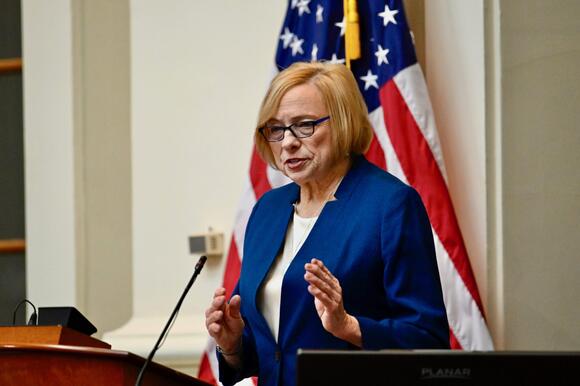Gov. Janet Mills gives her state of the budget address in January 2025. (Photo by Jim Neuger/ Maine Morning Star)
Gov. Janet Mills has opted to postpone her decisions on 61 bills that the Maine Legislature passed this year until lawmakers reconvene in January.
Among these bills are proposals to give the Wabanaki Nations exclusive rights to operate internet gaming in Maine, restrict local authorities from carrying out federal immigration enforcement, require serial numbers for so-called ghost guns, add Asian American, Native Hawaiian and Pacific Islander history to Maine’s learning results, and establish a statewide takeback program for firefighting foam contaminated with forever chemicals, following a spill in Brunswick last summer.
With the Legislature adjourned between its two-year session and the ten-day window after lawmakers concluded work now passed, Mills can either veto these bills within the first three days of the next session or allow them to become law without her signature after that.
“The Legislature passed a significant number of bills at the end of session, and the governor takes seriously her Constitutional obligation to thoroughly review all of them and to evaluate their implications on Maine people, Maine businesses, and the Maine economy,” Mills’ press secretary Ben Goodman said in a statement. “In order to meet that responsibility, she will continue to review these bills and gather more information, and she looks forward to acting on them at the beginning of the next legislative session.”
The Legislature also has the option to recall these bills from the governor’s desk, so proposals could still continue to be worked on next year.
Bills that become law after being held would be enacted in the subsequent session, meaning emergency legislation would take effect immediately but regular bills would take effect 90 days after the adjournment of that session.
The 61 bills being held are in addition to the nearly 400 that the Legislature opted to carry over into next year. While some of those bills had yet to make it out of committee, others received initial chamber votes but not enough to determine the final outcome. That legislation also includes all of the measures that were left on the appropriations and study tables, which had largely passed the full Legislature but needed to still be funded or staffed.

Some new bills can also be expected to be introduced next year, though any new measures are limited to budgetary matters, legislation from the governor and proposals considered emergency in nature by the Legislative Council, which is composed of the ten elected members of legislative leadership.
More than 500 bills became law this year. Mills vetoed five, all of which were sustained by lawmakers.







